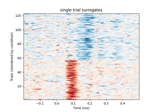mne.decoding.compute_ems¶
-
mne.decoding.compute_ems(epochs, conditions=None, picks=None, n_jobs=1, cv=None, verbose=None)[source]¶ Compute event-matched spatial filter on epochs.
This version of EMS [1] operates on the entire time course. No time window needs to be specified. The result is a spatial filter at each time point and a corresponding time course. Intuitively, the result gives the similarity between the filter at each time point and the data vector (sensors) at that time point.
- Parameters
- epochsinstance of
mne.Epochs The epochs.
- conditions
listofstr|None, defaultNone If a list of strings, strings must match the epochs.event_id’s key as well as the number of conditions supported by the objective_function. If None keys in epochs.event_id are used.
- picks
str|list|slice|None Channels to include. Slices and lists of integers will be interpreted as channel indices. In lists, channel type strings (e.g.,
['meg', 'eeg']) will pick channels of those types, channel name strings (e.g.,['MEG0111', 'MEG2623']will pick the given channels. Can also be the string values “all” to pick all channels, or “data” to pick data channels. None (default) will pick good data channels.- n_jobs
int The number of jobs to run in parallel (default 1). Requires the joblib package.
- cvcross-validation object |
str|None, defaultLeaveOneOut The cross-validation scheme.
- verbosebool,
str,int, orNone If not None, override default verbose level (see
mne.verbose()and Logging documentation for more). If used, it should be passed as a keyword-argument only.
- epochsinstance of
- Returns
References
- 1
Aaron Schurger, Sebastien Marti, and Stanislas Dehaene, “Reducing multi-sensor data to a single time course that reveals experimental effects”, BMC Neuroscience 2013, 14:122
